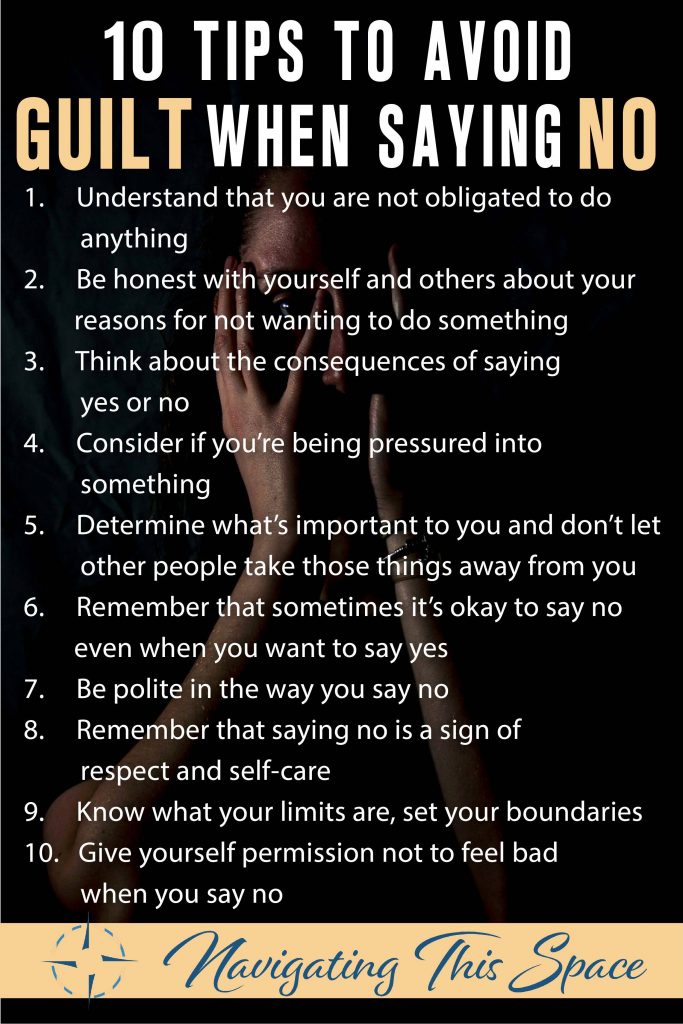One of the most difficult things to do is to say no.
Saying no can be especially challenging when you’re bombarded with requests from friends, family members, coworkers, and even strangers.
How do you say no without feeling guilty?
It’s easier than you think! In this blog post, I’ll share 10 tips on how to say no without feeling guilty.
How to say no without feeling guilty
Before you say no, consider whether the request is an unreasonable demand.
The person may be asking for a favor that they don’t really need help with or it might be something that could wait until you have more free time.
For example, your sister wants to borrow your car and go on vacation. However, you have an important business meeting during the time she wants to borrow the car. What do you do in this situation?
Don’t just say no without explaining the reason you’re declining her requests. Explain to her the conflict of your schedules and offer her another solution like renting a car.
Learning how to say no without feeling guilty takes practice but it becomes easier when you have a reason for saying no.
Remember that your feelings are a valid reason for saying no. If you don’t know exactly why you should say no but your gut feeling is telling you to decline, then you should trust that feeling one hundred percent.
It is not a weakness to say no when you don’t know how to proceed with an offer or opportunity. Sometimes we are so focused on doing what others want us to do that we fail to see the opportunities available for ourselves and our own desires.
Don’t forget that you hold the keys to your happiness, no one else.
How do you do what you want without feeling guilty?
In today’s society, it’s easy to fall into the trap of thinking that you must do things like everyone else. But the truth is, you have the power to do whatever YOU want.
There are two ways that you can go about accomplishing this:
– First, never commit yourself before thinking carefully and fully weighing your options.
– Second, don’t feel guilty if you don’t want to do something.
There are many ways that we can get guilt-tripped into doing things that we may not really want or need at this time in our lives. The most important thing is knowing when enough is enough.
Unfortunately, most people will use your kindness for their own satisfaction.
This is a form of manipulation.
They know that it is difficult for you to tell them no, so they take advantage of this feeling and guilt trip you into giving them more than you are able to or want to give.
This usually happens over time, so it is normal for you to not realize that this person has used your kindness against you until they have left and/or their need has been fulfilled by you.
Don’t let anyone manipulate your kindness for their own selfish needs.
To say no without feeling guilty, it’s important to realize that not everyone is as fortunate as you are. Sometimes saying yes can be detrimental.
Choose what situations you’re willing to help people in, and be honest with the person you’re saying no to.
This will prevent them from using your kindness against you over time and also keep them in a good mood so that they don’t walk away feeling angry or resentful towards you for not helping when they needed it most.
It’s also very much okay if friends or family think the worst of you for not helping them. That means they don’t appreciate your priorities. Their opinion of you has nothing to do with you. You know who you are so don’t let it bother you.
How do you say no politely?
When learning how to say no without feeling guilty, a quick way to decline a request is to adopt a “yes, but not now” approach.
If the person asking for help is someone close to you, and it won’t seriously affect your life in any negative way, simply explain why this request is being delayed.
This is the easiest way to buy yourself more time to think through your decision. It’s okay to change that yes into a solid no at a later time when you’re confident in your decision.
If the person asking for help is someone that you’re not close to, it’s okay to be more direct when declining their request. The words “I’m sorry but I can’t” and “This isn’t a good time” are perfect phrases to use in this situation.
It doesn’t matter if they don’t believe your reasons, you do not owe anyone anything, especially strangers.
A guide to the most effective ways to say no.
Awareness
The first step to saying NO is awareness and preparation.
When you stop and think before making any decision, you put yourself in a better position to make the best decision for YOU.
Be aware of what is being asked of you and take your time to prepare your response. Remain uncommitted by choosing not to decide swiftly and by providing an alternative solution.
Analyze the situation.
If what’s being asked of you is something that will take a considerable amount of your time, it has the potential to interfere with other plans and responsibilities or is not something you want to do right now, then it may be best for you to decline politely.
Never change your plans, your goals, and your schedule to make room for someone who doesn’t deserve your time.
Consider the request.
The type of request will show you the requestor’s intentions and true character.
If you’re being asked to do something that you would never ask anyone else to do, chances are you’re probably dealing with a manipulator.
Do not accept anything without understanding what’s being asked of you.
If the requestor does not have good intentions, they will say anything to get what they want.
Focus on your time, energy, and health as much as possible when you’re making any decisions.
You have the right to say no without feeling guilty.
Only say yes when you’re confident in your decision and have enough time to complete it.
Saying yes comes with a lot of responsibilities, and you need to be ready for them.
If your only reason for saying yes is to not feel guilty, you might not be ready to say yes.
You deserve the best in life, and that includes being able to make your own decisions without feeling bad about them later on.
If someone is making it difficult for you to say no, don’t feel obligated to do anything just because they asked nicely.
Learn to say what you mean and stick with it.
Be kind but don’t be afraid to be direct with people.
Your actions indeed have consequences. The decisions you make affect other people and most importantly, yourself.
Approach every situation with kindness, and know your boundaries. If you do not set boundaries, people will push you beyond your limits.
Consider what is too big of a request and prioritize your needs.
Ultimately, you are responsible for your own happiness, and it is up to you to decide how much time and energy you want to spend on other people’s requests.
Only say yes when the answer feels good in your heart.
Knowing your limits makes it a lot easier to say no without guilt.
How to avoid being pressured into anything.
Boundaries, boundaries, boundaries! Set your boundaries!
It’s hard for someone to try to pressure you into doing something you don’t want to do and succeeding if you know your boundaries.
It’s an important part of any decision you make in life.
Having strong personal boundaries prevents people from taking advantage of you or making unreasonable requests.
When someone knows your boundaries and chooses to ignore them, it’s a sign of disrespect.
No means no, not a maybe nor a yes. Until that no becomes something else on your own terms, it is still a solid no.
10 Tips to avoid guilt when saying no:
- Understand that you are not obligated to do anything.
- Be honest with yourself and others about your reasons for not wanting to do something.
- Think about the consequences of saying yes or no — will one decision lead to a better outcome in the long run, or is there more risk involved with that choice?
- Consider if you’re being pressured into something because someone else wants you to do it.
- Determine what’s important to you, and don’t let other people take those things away from you.
- Remember, sometimes it’s okay to say no even when you want to say yes.
- Be polite in the way you say no.
- Remember that saying no is a sign of self-respect and self-care
- Know what your limits are and set your boundaries. Don’t be afraid to push them if it’s going to make you happy or healthy.
- Give yourself permission not to feel bad when you say no.
What to do if you said yes but changed your mind
Saying yes doesn’t necessarily mean a better outcome for you or the people around you. Sometimes saying no is necessary because someone else can’t make up their mind or they don’t respect your boundaries.
If you’ve said yes to something and now realize that it’s not what you want to do, here’s how to approach the situation:
– First and foremost, be honest.
This is important because it shows that you’re not trying to avoid the situation. Honesty is the best policy, and people will respect you more for being honest with them even if they didn’t get your help.
– Tell them what your boundaries are so they’ll understand why you said no.
For example, if you said yes to a party invitation and later changed your mind because you didn’t feel like going or genuinely needed to rest. Just call the person who extended the invitation and tell them the truth. Explain that you weren’t feeling up to it or you needed some time to yourself, and they’ll understand.
– Suggest something else.
After you’ve explained your reasons, you can further help by offering an alternative.
Suggesting an alternative plan instead of saying no will make both parties happy and avoid any unnecessary arguments.
If the person refuses to understand and chooses to argue instead, walk away from the situation.
It’s okay to be selfish sometimes!
Saying yes when you mean no can and will always lead to devastating consequences.
Saying yes when you want to say “no” can lead to a buildup of resentment that affects your relationships with friends and family members as well as negatively impacting your life.
The best way to avoid this is by setting clear boundaries for yourself — What are the things you’ll always say “yes” to?
– What are the things you’ll never do again?
– How will these decisions affect others in your life?
Once you know your own mindset about what’s important to you, you can be more mindful about honoring the commitments you choose to accept.
Everything becomes easier with time!
Remember this next time someone asks you for your help with anything.
Share a story in the comments below on how these tips helped you learn to say no without feeling guilty.
Pin It!






Thank you for this great post. I really need this!
This is a difficult one and definitely takes some practice….well, it did for me. Thank you so much for all your suggestions, nice to see it so broken down. Thank you!!